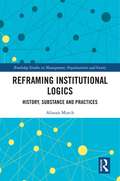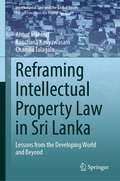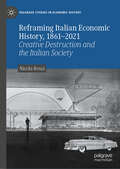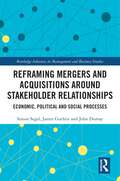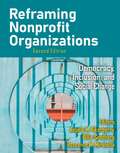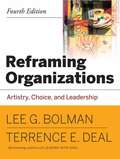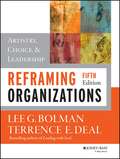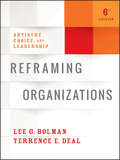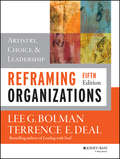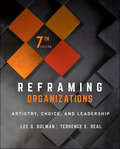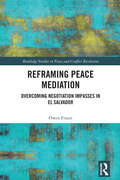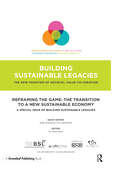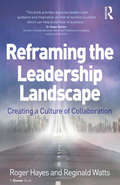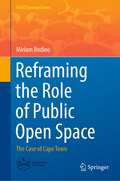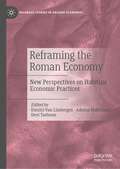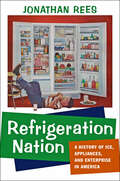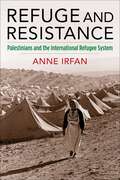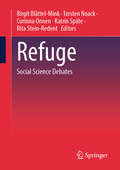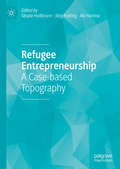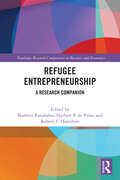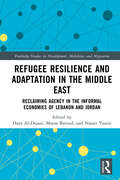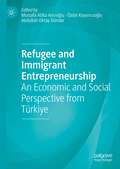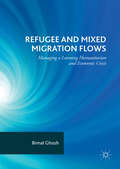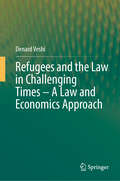- Table View
- List View
Reframing Institutional Logics: Substance, Practice and History (Routledge Studies in Management, Organizations and Society)
by Alistair MutchHow are we to characterise the context in which organisations operate? The notion that organisational activity is shaped by institutional logics has been influential but it presents a number of problems. The criteria by which institutions are identified, the conflation of institutions with organisations, the enduring nature of those institutions and an exaggerated focus on change are all concerns that existing perspectives do not tackle adequately. This book uses the resources of historical work to suggest new ways of looking at institutional logics. It builds on the work of Roger Friedland who has conceived of institutional logics being animated by adherence to a core substance that is immanent in practices. Development of this idea in the context of organisation theory is supported by ideas drawn from the work of the social theorist Margaret Archer and the broader resources of the philosophical tradition of critical realism. Institutions are seen to emerge over time from the embodied relations of humans to each other and to the natural world on which they depend for material existence. Once emergent, institutions develop their own logics and endure to form the context in which agents are involuntarily placed and that conditions their activity. The approach adopted offers resources to ‘bring society back in’ to the study of organisations. The book will appeal to graduate students who are engaging with institutional theory in their research. It will also be of interest to scholars of institutional theory, of the history of organisations and those seeking to apply ideas from critical realism to their research.
Reframing Intellectual Property Law in Sri Lanka: Lessons from the Developing World and Beyond (International Law and the Global South)
by Althaf Marsoof Kanchana Kariyawasam Chamila TalagalaThis book is a reflection on domestic intellectual property lawmaking from a developing country’s perspective. It focuses on Sri Lanka—a South Asian jurisdiction with a socio-economic, cultural, and political landscape similar to other developing nations in the region, but the intellectual property regime of which has been less explored. The aim of this book is to address the discrepancies, gaps, and flaws in the national intellectual property legal framework of Sri Lanka. In doing so, the book considers Sri Lanka’s obligations under TRIPS and other related intellectual property treaties to which the country is a party. The book also examines approaches adopted by developing countries in the region and beyond, as well as other more developed nations, in calibrating Sri Lanka’s domestic intellectual property regime to better address the country’s domestic needs and national interests. The approach adopted in this book is of relevance, more generally, to policymakers, legislators, legal academics, scholars, jurists, legal practitioners and judges who are keen on exploring the extent to which domestic intellectual property legislation complies with international intellectual property norms and standards and, more importantly, the extent to which domestic law makes use of the flexibilities under international law in addressing domestic needs and national interests.
Reframing Italian Economic History, 1861–2021: Creative Destruction and the Italian Society (Palgrave Studies in Economic History)
by Nicola RossiThis book surveys the development of the Italian economy over the 150 years since unification, integrating economic analysis with an economic and social history of Italian society. The book challenges several key assumptions about the growth of the Italian economy, including the notion that Italy has ‘caught up’ with its main Western partners and arguing that in long-run perspective the Italian economy has performed disappointingly. In particular, the book highlights how the role of cultural values, beliefs and preferences are just as important as institutions and institutional change in explaining the trajectory of the economy, arguing that a widespread ‘growth-averse’ culture exists in Italian society that diverges from the dominant market paradigms of the Western world. Rather than treating the twenty years after WWII – the period of rapid growth known as Italy’s ‘economic miracle’ years – as an indicator of Italy’s success, the author analyses these years as an anomaly where capitalist processes like creative destruction and innovism were briefly permitted to flourish. The book draws out key questions, for example exploring why institutional reforms have not led to sustained rates of growth, and why other markers of quality of life have improved in Italy while economic performance has remained slow. This book will be a fascinating read for scholars of economics and economic history, as well as non-specialist readers looking for a comprehensive understanding of Italian socio-economic conditions since the country's unification.
Reframing Mergers and Acquisitions around Stakeholder Relationships: Economic, Political and Social Processes (Routledge Advances in Management and Business Studies)
by James Guthrie John Dumay Simon SegalAmong the significant repercussions of the coronavirus pandemic is escalating public questioning of the desirability and sustainability of the market economy and the societal role of business. These concerns are linked to merger and acquisition (M&A) activity, with significant disruptive consequences for stakeholder relationships and their management. This book explores these changes, moving away from the traditional focus on the financial and strategic aspects of M&A and its rational, technocratic approach. Viewing M&A activity as economic, political, and social (EPS) processes, Segal provides a dialectic understanding of stakeholder relationships around M&A activity and challenges the view that M&A activity is static, linear, and predictable. He develops a conceptual framework to enable practitioners, researchers and policymakers to identify, understand and address the stakeholder and management implications of M&A activity. This is applied to four case studies that make explicit how complex stakeholder relationships play out around M&A and how these power dynamics were managed with different balances. Useful for academics, researchers, managers, advisors, investors, analysts, and other stakeholders, this book highlights the need to understand the EPS implications and processes involved around M&A.
Reframing Nonprofit Organizations: Democracy, Inclusion, and Social Change
by Roseanne M. Mirabella Angela M. Eikenberry Billie SandbergNow more than ever, students of nonprofit and voluntary organization management need tools, methods, and case studies that enable them to critically think about how to not only cope with, but also change, the environments in which they work. This book serves as a critical companion to other nonprofit management textbooks, providing students with an opportunity to rethink unquestioned assumptions about nonprofit and voluntary organizations and their management and to challenge the status quo, providing an avenue for lively and engaging classroom discussions. Each chapter addresses important topics of nonprofit and voluntary organization management—including board governance, leadership, government relations, and human resource, financial, and volunteer management—applying critical perspectives to very practical case studies and examples. Concepts covered are understandable to anyone regardless of previous knowledge or background and introduce more interesting and inspiring content to students.
Reframing Organizations: Artistry, Choice, and Leadership
by Lee G. Bolman Terrence E. DealBolman (leadership, University of Missouri) and Deal (education, University of Southern California) describe four frames through which to view all types of organizations. They show how the structural, human resource, political, and symbolic frames can be employed to find new opportunities in organizations. This third edition highlights current developments in leadership and presents new case histories from organizations such as eBay, Enron, and the US Marine Corps.
Reframing Organizations: Artistry, Choice, and Leadership
by Lee G. Bolman Terrance E. DealThoroughly updated, this fifth edition of the classic book outlines its four-frame model that examines organizations as factories, families, jungles, and theaters or temples: The Structural Frame: organize and structure groups and teams; The Human Resource Frame: tailor organizations to satisfy human needs, improve HRM, and build positive personal and group dynamics; The Political Frame: cope with power and conflict, build coalitions, hone political skills, and deal with politics; and The Symbolic Frame: shape a culture that gives purpose and meaning to work, stage organizational drama, and build team spirit.
Reframing Organizations: Artistry, Choice, and Leadership
by Lee G. Bolman Terrence E. DealSet aside trends to focus on the fundamentals of great leadership Reframing Organizations provides time-tested guidance for more effective organizational leadership. Rooted in decades of social science research across multiple disciplines, Bolman and Deal's four-frame model has continued to evolve since its conception over 25 years ago; this new sixth edition has been updated to include coverage of cross-sector collaboration, generational differences, virtual environments, globalization, sustainability, and communication across cultures. The Instructor's guide has been expanded to provide additional tools for the classroom, including chapter summary tip sheets, mini-assessments, Bolman & Deal podcasts, and more. These recent revisions reflect the intersection of reader recommendations and the current leadership environment, resulting in a renewed practicality and even greater alignment with everyday application. Combining the latest research from organizational theory, organizational behavior, psychology, sociology, political science and more, the model detailed here provides real guidance for real leaders. Guide, motivate, and inspire your team's best performance as you learn to: Optimize group, team, and organizational structure Build a positive, collaborative dynamic across generations, teams, and sectors Understand power and conflict amidst the internal and external political landscape Shape your organization's culture and build a cohesive sense of spirit Bolman and Deal's four-frame model has withstood the test of time because it offers an accessible, compact, and powerful set of ideas for navigating complexity and turbulence. In today's business climate, leadership trends come and go; today's flash in the pan is tomorrow's obsolete strategy, but a leadership framework built on a solid foundation will serve your organization well no matter what the future holds. Reframing Organizations provides clear guidance and up-to-date insight for anyone facing the challenges of contemporary leadership.
Reframing Organizations: Artistry, Choice, and Leadership
by Lee G. Bolman Terrence E. DealIn this fifth edition of the bestselling text in organizational theory and behavior, Bolman and Deal’s update includes coverage of pressing issues such as globalization, changing workforce, multi-cultural and virtual workforces and communication, and sustainability. A full instructor support package is available including an instructor’s guide, summary tip sheets for each chapter, hot links to videos & extra resources, mini-assessments for each of the frames, and podcast Q&As with Bolman & Deal.
Reframing Organizations: Artistry, Choice, and Leadership
by Lee G. Bolman Terrence E. DealAN ELEGANT FRAMEWORK FOR MORE EFFECTIVE LEADERSHIP Bolman and Deal’s four-frame model has been transforming business leadership for over 40 years. Using a multidisciplinary approach to management, this deceptively simple model offers a powerful set of tools for navigating complexity and turbulence; as the political and economic climate continues to evolve, this model has never been more relevant than today. The Structural Frame explores the convergence of organizational structure and function, and shows why social architecture must take environment into account. Case studies illustrate successful alignment in diverse organizations, and guidelines provide strategic insight for avoiding common pathologies and achieving the right fit. The Human Resource Frame dissects the complex dynamics at the intersection of people and organizations and charts the leadership and human resource practices that build motivation and high performance. The Political Frame shows how competition, conflict, and the struggle for power and resources can be either a tool for growth or a toxic landmine for an individual or organization. Case studies show how both constructive and destructive practices influence social, political, and economic trends both within and beyond organizational boundaries. The Symbolic Frame defines organizational culture, and delves into the emotional and existential underbelly of social life. It underscores the power of symbolic forms such as heroes, myths, and rituals in providing the glue that bonds social collectives together. The Seventh Edition has been updated with new information on cross-sector collaboration, generational differences, virtual environments, globalization, cross-cultural communication, and more, with an expanded Instructor’s Guide that includes summaries, mini-assessments, videos, and extra resources.
Reframing Peace Mediation: Overcoming Negotiation Impasses in El Salvador (Routledge Studies in Peace and Conflict Resolution)
by Owen FrazerThis book explains how facilitative mediators, those without material leverage, contribute to progress in peace negotiations.While existing theories of mediation have offered suggestions about what a mediator should get parties to do to reach an agreement, the puzzle that has remained is: how does a mediator get parties to do what is prescribed? The book argues that a communication perspective is key to understanding facilitative mediation and that framing is the main mechanism by which facilitative mediation functions. Based on an empirical analysis of the United Nations mediation in El Salvador between 1990 and 1992, the work breaks new ground by uncovering three underlying mechanisms that explain how a mediator can get their framing adopted by the negotiating parties, thereby advancing the negotiations. The book offers a novel theory of facilitative mediation as framing and an innovative methodological approach that focuses on negotiation impasses to study the process of how negotiations progress. Practitioners will also appreciate the framework for thinking about when and how framing and reframing can be used to increase mediation’s effectiveness as a tool for ending armed conflict.This book will be of much interest to students of peace and conflict studies, negotiation, Latin American politics, and International Relations, as well as practitioners.
Reframing the Game: A Special Issue of Building Sustainable Legacies
by Mike Townsend Katrin MuffCapitalism is fast approaching the tipping point into a new sustainable economy that will allow people and the planet to prosper. Pieces of a jigsaw are coming together and bringing into focus a picture of a new, vibrant, attractive and sustainable economic operating system. This quiet revolution is underway - if we could only allow it to flourish.This Special Issue of Building Sustainable Legacies brings together key voices in business and academia that show us how to accelerate towards this tipping point by exploring the role that business in society, responsible education, leadership techniques and legal reform will have in shaping the new sustainable economy.Including contributions from Paul Polman, Katrin Muff, Beate Sjafjell and Gabriele Zedlmayer, this outstanding collection proposes leading insights and innovative solutions to the challenge of creating new economies that work for people and the planet.
Reframing the Leadership Landscape: Creating a Culture of Collaboration
by Roger Hayes Reginald WattsIn an uncertain and complex world leaders should not merely respond to the speed of change but attempt to anticipate it. Sometimes it is unexpected, sometimes the signs are there but the dots are not joined together. The NEW normal must be navigated, negotiated, networked and a narrative built around it. Leaders need to adapt to a changing ecosystem in which the biggest challenges cross the boundaries of the public, private and non-profit sectors, requiring much closer collaboration. Aggressive individualism is no longer a sustainable basis for companies needing to deliver social and economic value, now, enterprises must move beyond narrow self-interest and short-termism to balance stakeholder expectations. In Reframing the Leadership Landscape, Dr Roger Hayes and Dr Reginald Watts argue that the interconnected and interdependent world requires leaders to adopt a more holistic and inclusive approach. Despite global business education advances, business mostly fails to make cross-disciplinary connections or interpret weak signals and is ill-prepared for changes in cultural and technical demands. The tool kit is here, ready to be unpacked. The only question is whether aspirant leaders are sensitive enough to read the signals and develop the skills needed to create an essential collaborative paradigm, which they must do if they wish to regain trust, fill the leadership void and help reshape a sustainable future.
Reframing the Opportunity Space: How Allianz Identified New Opportunity Spaces--Studying the Demand Landscape for Hidden Growth Opportunities
by Erich JoachimsthalerA demand landscape provides a powerful point of departure to explore opportunities by using, figuratively speaking, a varied set of binoculars and photographic lenses. To ensure continued growth, your company must continually reframe its opportunity space and enlarge the areas where you can seek opportunities in order to stay relevant to customers' lives. This chapter uses the case of Allianz to illustrate the benefits of adopting breakthrough innovation and growth lenses that will help you detect hidden opportunities.
Reframing the Role of Public Open Space: The Case of Cape Town (PoliTO Springer Series)
by Miriam BodinoThis book explores the growing spatial inequality in contemporary cities, and the opportunity of reframing the role of public open space as a tool of inclusion in a context of an increasing economic gap between the urban poor and rich. The first part outlines the geographical and theoretical frames of reference, which are then tested in the analysis of a case study: Cape Town. This city in South Africa was selected since its spatial aspects of separation are particularly evident due to the legacy of both apartheid and modernism. The examination of the policies of the City of Cape Town confirms the rising attention to public space since the 1990s. This slow progress of desegregation is tested through a critical study of one of the most disadvantaged areas of the city, Khayelitsha. The book explores the relevance and impact of an urban-design project, and reframes the role of public open space not only as a tool for restructuring the apartheid city, but also for reinterpreting other fragmented contemporary cities.
Reframing the Roman Economy: New Perspectives on Habitual Economic Practices (Palgrave Studies in Ancient Economies)
by Dimitri Van Limbergen Adeline Hoffelinck Devi TaelmanThis book focuses on those features of the Roman economy that are less traceable in text and archaeology, and as a consequence remain largely underexplored in contemporary scholarship. By reincorporating, for the first time, these long-obscured practices in mainstream scholarly discourses, this book offers a more complete and balanced view of an economic system that for too long has mostly been studied through its macro-economic and large-scale – and thus archaeologically and textually omnipresent – aspects. The topic is approached in five thematic sections, covering unusual actors and perspectives, unusual places of production, exigent landscapes of exploitation, less-visible products and artefacts, and divergent views on emblematic economic spheres. To this purpose, the book brings together a select group of leading scholars and promising early career researchers in archaeology and ancient economic history, well positioned to steer this ill-developed but fundamental field of the Roman economy in promising new directions.
Refrigeration Nation: A History of Ice, Appliances, and Enterprise in America (Studies in Industry and Society)
by Jonathan ReesHow we keep food cold while the house stays warm.Only when the power goes off and food spoils do we truly appreciate how much we rely on refrigerators and freezers. In Refrigeration Nation, Jonathan Rees explores the innovative methods and gadgets that Americans have invented to keep perishable food cold—from cutting river and lake ice and shipping it to consumers for use in their iceboxes to the development of electrically powered equipment that ushered in a new age of convenience and health.As much a history of successful business practices as a history of technology, this book illustrates how refrigeration has changed the everyday lives of Americans and why it remains so important today. Beginning with the natural ice industry in 1806, Rees considers a variety of factors that drove the industry, including the point and product of consumption, issues of transportation, and technological advances. Rees also shows that how we obtain and preserve perishable food is related to our changing relationship with the natural world.
Refuge and Resistance: Palestinians and the International Refugee System (Columbia Studies in International and Global History)
by Anne IrfanIn the decades after World War II, the United Nations established a global refugee regime that became central to the lives of displaced people around the world. This regime has exerted particular authority over Palestinian refugees, who are served by a specialized UN body, the Relief and Works Agency (UNRWA). Formed shortly after the 1948 war, UNRWA continues to provide quasi-state services such as education and health care to Palestinian refugee communities in the Middle East today.This book is a groundbreaking international history of Palestinian refugee politics. Anne Irfan traces the history and politics of UNRWA’s interactions with Palestinian communities, particularly in the refugee camps where it functioned as a surrogate state. She shows how Palestinian refugees invoked internationalist norms to demand their political rights while resisting the UN’s categorization of their plight as an apolitical humanitarian issue. Refuge and Resistance foregrounds how nonelite activism shaped the Palestinian campaign for international recognition, showing that engagement with world politics was driven as much by the refugee grass roots as by the upper echelons of the Palestine Liberation Organization. It demonstrates that refugee groups are important actors in global politics, not simply aid recipients.Recasting modern Palestinian history through the lens of refugee camps and communities, Refuge and Resistance offers vital new perspectives for understanding politics beyond the nation-state.
Refuge: Social Science Debates
by Birgit Blättel-Mink Katrin Späte Torsten Noack Corinna Onnen Rita Stein-RedentThe welcome culture of 2015 in Germany has, not least due to the (re)definition of safe countries of origin, turned into a deportation policy. How can this change in policy be understood and is it also accompanied by a change of attitude among the population? Which reasons for and which reasons against the admission of refugees are cited in social debates? This volume brings together analyses of the social discourse on dealing with refugees, questions of labour market integration and the practice of counselling refugees. Alongside academic analyses are reflective contributions from the practice of migration policy.With contributions by Olaf Struck.- David Stiller.- Helge Döring and Sebastian Kurtenbach.- Ann-Christine Lill, Janis Schneider and Sam Schneider.- Kirsten Hoesch. - Kathrin Weis.- Theresa Köhler and Kerstin Ettl.- Doris Beer.- André Pohlmann.- Katharina Resch, Gertraud Kremsner, Michelle Proyer, Camilla Pellech, Regina Studener-Kuras and Gottfried Biewe.The editors: Prof. Dr. Birgit Blättel-Mink is Professor of Sociology with a focus on industrial and organizational sociology at the Goethe University in Frankfurt/Main. Torsten Noack, M.A. Sociology, Head of the School for Work Education of the International Federation Stuttgart. Prof. Dr. Corinna Onnen is university professor for general sociology at the University of Vechta. Dr. Katrin Späte works at the Institute for Sociology at the University of Münster. Apl. Prof. Dr. Rita Stein-Redent works at the University of Vechta.
Refugee Entrepreneurship: A Case Based Topography
by Sibylle Heilbrunn Jörg Freiling Aki HarimaThrough a global series of case studies, this pioneering book delves into refugee entrepreneurship - a major economic, political and social issue emerging as a top priority. Stories from Australia, Germany, Pakistan and many other countries, highlight the obstacles facing refugees as they try to integrate and set up businesses in their new countries. Engaging contributions set the stage for a cross-analysis of the particularities and limitations faced by refugee entrepreneurs, culminating in an extended discussion about the future implications of refugee entrepreneurship for theory, policy and practice. This interdisciplinary book explores the motivations and drivers of refugee entrepreneurship, making it an insightful read not only for those engaged in entrepreneurship, but also for those interested in migration studies from a variety of academic disciplines.
Refugee Entrepreneurship: A Research Companion (Routledge Research Companions in Business and Economics)
by Ranabahu, Edited by NadeeraThis comprehensive volume explores the phenomenon of refugee entrepreneurship and advances the discussions and debates in the domain.The growing number of refugees across the world creates a compelling need to study the social and economic activities of refugees in different contexts, and to share experiences and debate how to better support refugee populations. This book covers academic, practical, and policy issues in refugee entrepreneurship, seeking to present the current status of research in this evolving field. The topics include how to identify and differentiate refugee entrepreneurship; refugees’ business practices; the personal, economic, and social values and impacts of refugee entrepreneurship; and the institutional support and role of ecosystems in facilitating refugee entrepreneurship. Future research directions are also outlined. This book provides scholars with the theoretical foundations and evidence base to advance refugee entrepreneurship research. Support agencies will learn from the experiences of others about the delivery of tailored support and policymakers will recognise the need for empathy and consistency in developing host country strategies for refugees.
Refugee Resilience and Adaptation in the Middle East: Reclaiming Agency in the Informal Economies of Lebanon and Jordan (Routledge Studies in Development, Mobilities and Migration)
by Haya Al-Dajani Nasser Yassin Maysa BaroudThis edited volume investigates how refugee communities in the Middle East have adapted to secure their livelihoods within the informal economy. Focusing on Lebanon and Jordan, which between 2011 and 2020 received more refugees as a proportion of their population than any other countries in the world, this edited volume investigates the informal mechanisms that Syrian refugees have adopted to fit into the informal economies of Lebanon and Jordan in the face of significant challenges and barriers. The volume investigates how legality, temporality, connectedness, gender, and geography, among other factors, have influenced the emergence of refugee communities’ informal adaptive mechanisms. Drawing on in-depth, original research among Syrian refugee tribal communities, agricultural workers, female-headed households, and micro-entrepreneurs, the volume provides tangible policy and practice recommendations to help to improve the situation of refugees and vulnerable populations that are employed in the informal economy. Highlighting the resilience and agency demonstrated by refugees, this edited volume’s original community-based analysis will be of interest to students, researchers, and professionals from across Middle East studies, refugee studies, informal labor economics, and development studies.
Refugee and Immigrant Entrepreneurship: An Economic and Social Perspective from Türkiye
by Mustafa Atilla Arıcıoğlu Özdal Koyuncuoğlu Abdullah Oktay DündarDue to political and economic instability in the Middle East and North Africa (MENA) countries, an increasing number of inhabitants continue to migrate to other countries. From here, they either join employment or become refugee or immigrant entrepreneurs. Such developments carry risks such as integration problems, but there are also significant opportunities. This book takes a deep dive into those challenges and potential prospects, and places special emphasis on Türkiye, a region that is significantly impacted by migration from Syria, Afghanistan, Pakistan and other African countries.Chapters explore the various issues around refugee and immigrant entrepreneurs within their host countries. Authors offer analysis of the difficulties experienced by such entrepreneurs in economic and socio-cultural contexts. Including various field examples using qualitative and quantitative research methods and economic implications using macro analysis, the book offers policy recommendations, examines the opportunities of refugee and immigrant entrepreneurship in Türkiye and explores the benefits to Türkiye from a holistic perspective.
Refugee and Mixed Migration Flows: Managing a Looming Humanitarian and Economic Crisis
by Bimal GhoshThis book provides an insightful analysis of the looming refugee and mixed migration crisis in the context of four major, contemporary flows: two in west and east Europe, and one each in the Americas and Asia. The analysis, in each case, is followed by a judicious identification of the key issues involved and the presentation of a set of proposed policy responses to them. The discussion is then placed in a global setting and dovetailed with the recently launched United Nations initiative to adopt global compacts on refugees and migrants. The author brings to this book, the first of its kind, his vast experience of advising, and actively engaging with, many of the principal international organisations concerned with refugee and migration issues. This book will be of interest to researchers, students, NGOs, professional bodies, national ministries, international organisations and rights groups in the fields of economics, public finance, political economy, human rights and refugee law, and international relations and demography.
Refugees and the Law in Challenging Times – A Law and Economics Approach
by Denard VeshiThis book focuses on the economic analysis of refugee law and the protection of refugee rights. It offers a law and economics model applied to migration and states. The book focuses on the most critical ‘push’ factors that impact lawmakers in enacting and modifying asylum law. Furthermore, the book examines the economic advantages and disadvantages of a centralized supernational asylum law (acquis communautaire) that could, eventually, eliminate competition between legal orders in asylum law and do away with the negative externalities caused by ‘asylum shopping’. The book critically analyses international refugee law, pursuing an interdisciplinary approach. Its principal goal is to explore refugee law through the lenses of the law and economics approach and against the backdrop of a human rights approach. After explaining the evolution of the human rights approach, the book elaborates on the legal and economic factors that impact refugees, on the one hand, and public policy, on the other. In conclusion, a balance that considers the national preferences of destination countries and the protection of refugee rights is proposed.
